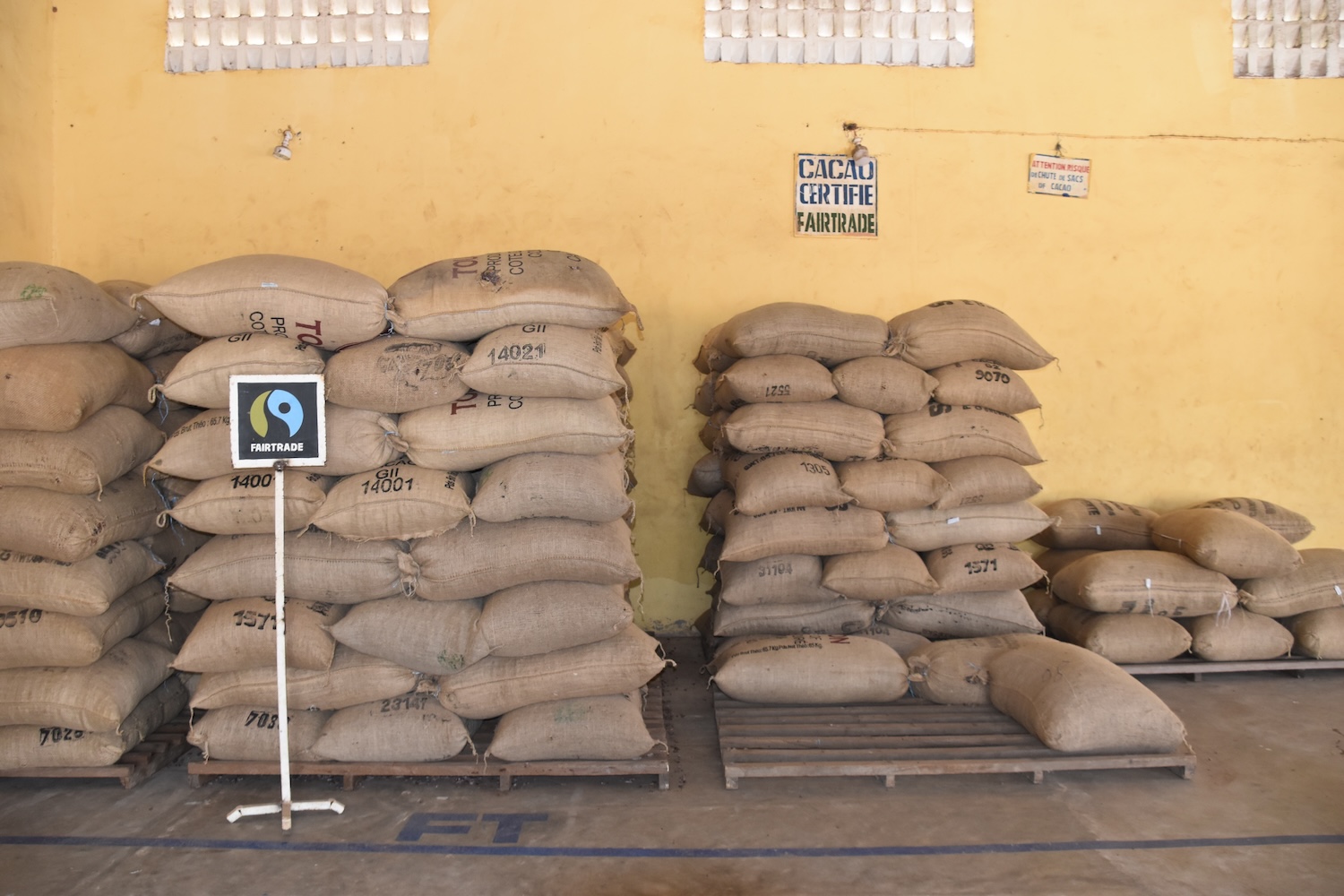
As cocoa farmers in West Africa face more extreme weather, decades of underpayment leave them less able to adapt. (Image courtesy of Fairtrade International)
This story is part of From the Frontline, a guest-contributed column where we hear directly from climate justice advocates and those who are impacted by climate change. If you're interested in contributing your perspective to this column, please get in touch with us here.
Historically high prices for cocoa, the main ingredient in chocolate, have been making global headlines since chocolate Easter bunnies hit shelves earlier this spring. News coverage highlighted some of the key drivers of this rapid price spike, particularly a significant reduction in cocoa supply driven by a changing climate. Most estimates predict prices will continue to be more than double the average of the preceding decade because key producing countries, Ghana and Cote D’Ivoire, anticipate more supply deficits.
But here’s what the headlines are often missing: Today’s crisis stems from the longstanding exploitation of farmers, which stripped resilience out of these supply chains many years ago. This isn’t isolated to cocoa. The same commodity price trends are taking hold in coffee, with extreme droughts in Southeast Asia impacting the supply of Robusta coffee. Bananas, another American grocery staple, are likely next.
Cocoa, coffee and banana farmers are struggling to adapt to climate change, crop disease, aging trees, and persistent price volatility because of chronic, decades-long underpayment for their goods and labor — something which my organization, Fairtrade International, has warned about for years. Our 2023 report revealed how susceptible these supply chains are to threats caused by climate change and other environmental issues like deforestation and biodiversity loss.
Coffee growing regions around the world are at risk. Higher temperatures and altered rainfall patterns are making coffee harder to grow, increasing pests and diseases. Long-term, the number of regions best suited for growing coffee will be cut in half over the course of the next 25 years.
Frequent floods and storms in the tropical regions where bananas grow are making production unpredictable and unsustainable. In fact, four of the five countries America imports the majority of its bananas from – Guatemala, Ecuador, Honduras and Colombia – are rated “vulnerable” or “highly vulnerable” to the negative impacts of climate change, according to the University of Notre Dame Global Adaptation Initiative.

Large, wealthy companies throughout the supply chain have not done enough to compensate struggling farmers. Chocolate is a $130 billion industry, and while cocoa yields dwindle, the biggest companies involved are raking in record profits with increasing stock buybacks and dividends to boot. All this as they’ve passed on price increases to customers while shrinking sizes and cocoa content in their products. But even while big companies leverage these crises in the short term, they undermine their own futures as they allow farmers’ livelihoods to erode.
There is a simple solution that benefits the entire supply chain: Pay farmers more. While charitable giving and corporate philanthropy are helpful short-term buffers, lasting change comes from baking higher prices to farmers into the core business model. Payment must be enough to allow farmers, their families and their communities to not only live with dignity, but also to thrive and reinvest their profits in climate-resilient practices that prevent product shortages and protect longevity. This is better for farmers, and it carries long-term benefits for shoppers and companies.
For example, the majority of 10,000 smallholder coffee farmers who participated in Fairtrade’s Climate Academy in Machakos and Kericho, Kenya, had little to no prior knowledge of climate change. While these farmers contribute very little to global carbon emissions, they are the first to experience climate consequences. Irregular rainfall, periods of severe drought and rising temperatures lead to uncertain yields for small farms.
Climate Academy sessions spanning three years, including hands-on demonstrations, helped improve farmers’ awareness of climate change and helped farming cooperatives better prepare to identify agricultural problems, allocate financial resources, and implement mitigation measures efficiently. During hands-on demonstrations, participants learned how to adapt their farming methods for changing weather through practices like pruning, fertilizing, irrigation and shade. As a result, coffee farmers in Machakos have 20 percent more shade trees to protect their coffee from the sun, their cooperatives have invested in water tanks to store water for use during dry spells, and they have reported higher yields per coffee bush.
A world without chocolate, coffee or bananas could be reality if the wealthiest, most powerful players in the supply chain do not start paying farmers a fairer price. Investing in them now will help establish climate change resilience and create thriving communities while keeping shelf prices down for shoppers by preventing product shortages and protecting the longevity of the products we love. Paying farmers more is the first step in rebalancing inherently unequal global trading structures that put profits before people and the planet. The future of these products, and these farming communities, depends on it.

Amanda Archila serves as Executive Director of Fairtrade America, where she leads the organization in increasing market access for Fairtrade farmers and workers by cultivating impact-driven relationships with businesses and expanding consumer demand for Fairtrade goods. Archila’s roots in the fair trade movement began as a student activist and through the launch of a domestic fair trade certification in India with cotton farmers. Since then, Archila has gained more than 15 years of experience working in a range of industries, from natural food to e-commerce retail and consumer electronics.














